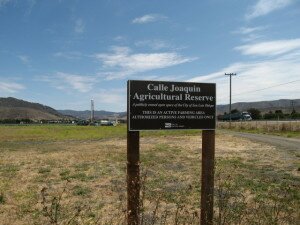By Camas Frank
 The City Farm operating on the Calle Joaquin Agricultural Reserve Open Space preserves and owned by the City of San Luis Obispo is undergoing a little reboot of operations.
The City Farm operating on the Calle Joaquin Agricultural Reserve Open Space preserves and owned by the City of San Luis Obispo is undergoing a little reboot of operations.
Nicki Anderson the new City Farm manager and educator hired on at the end of last year explained that Central Coast Grown (CCG), the nonprofit contracted to run the farm, recently lost grant funding for the position of executive director, formerly occupied by Jenna Smith.
About the same time, Anderson said, CCG was informed that its primary tenant on 14 acres, Nico Farms, would no longer occupy the property.
“Nico left in December. I think we all started with lots of hope that things would work out,” said Anderson, who herself recently moved here from Massachusetts, to take on the job of managing the nonprofit’s own space and working with the kids from Pacific Beach High School which has gardens on the property. “It had a lot to do with the amount of space they were renting and the experience for them not being a match in the end.”
While CCG continues to pursue outside funding from grants and other sources, income from Nico represented the budget for their office operations.
However, there’s now room to pursue a more sustainable and stable model for the rentals. Beginning Feb. 1, CCG is reviewing applications for new tenants on the acreage, with the ideal model being seven good candidates taking 2 acres each, she explained.
CCG manages the master lease from the City and works out all the relationships with that landlord, so all applicants need to do is convince the CCG that they’re a good candidate for the reserve space’s mission of “agricultural production and education.”
Located along Highway 101 between Madonna and Los Osos Valley roads, the space is occasionally open to the public for events but any established farmers looking to expand production or young people trying to get a foothold in the industry would be good candidates for the irrigated, Class One and Class Two farmland.
Anderson points out that during all of the recent drought worries, the reserve space was among the few locations in the region to have access to adequate water supply on its own wells.
The official description of what they’re asking is for “several qualified individuals/organizations motivated to enrich our community through farming on portions of these fourteen acres of land, with between 1 and 10 acres for each farming enterprise proposed. The property has been cover cropped and farmed without chemical inputs for the last six years, and must remain viable for organic certification. The amount of acreage and length of the lease are negotiable (between 1-10 acres and 1-5 years). The farmland to be leased is intended for row crops, with the possibility for perennial plantings and animal husbandry, and has access to excellent water resources.”
To find out more go online to: www.centralcoastgrown.org.

